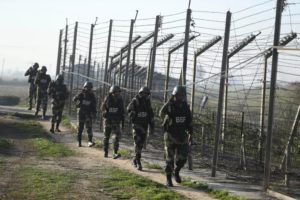Support for some state responses to pandemic reaches levels rarely seen in polling, researcher says
Trust in government has soared to an “extraordinary” high during the pandemic, upending years of scepticism about Australian politicians, the annual survey of social attitudes has revealed.
Initial findings from the Scanlon Foundation’s Mapping Social Cohesion Report show 85% support for the federal government’s response to the pandemic, while backing for some state governments exceeded 90%.
Trust in the federal government to generally “do the right thing” was at a record high 55%, topping the previous record of 48% in 2009. The measure had averaged just 32% over the past 13 years.
“That’s quite an extraordinary finding,” said Andrew Markus, an emeritus professor at Monash University and the survey’s lead researcher.
“Usually we get very little change in the surveys from just one year to the next. Now, of course, we don’t often get a pandemic. So you would expect a shift in opinion.
“But the shift in opinion is moving in a positive direction with regards to government.”
The survey of 3,000 respondents, which was released on Thursday and has been conducted every year since 2007, examines attitudes and perceptions of diversity, migration, trust in government, among other issues.
While 63% of Australians surveyed said the pandemic was the most important issue in July, the figure fell to 32% in November, followed by the economy (24%) and climate change (13%).
Markus noted support for some governments’ responses to the pandemic had reached levels rarely seen in polling. That included 99% support among respondents in Western Australia and 92% from Queensland respondents.
In New South Wales, 81% of respondents indicated support for Gladys Berejiklian’s government’s response in July.
Even in Victoria, where significant failings within the hotel quarantine program were the cause of a lengthy second wave, 65% approved of Daniel Andrews’ government’s handling of the pandemic in July. By November that figure had risen to 78%.
The survey also found overwhelming support for the lockdowns imposed in March.
Some 95% of respondents endorsed those measures, with 80% saying they were “definitely required”, while a November polling question focused on Victoria’s severe second lockdown found 87% of respondents in the state backed the move.https://interactive.guim.co.uk/charts/embed/dec/2020-12-16T02:07:26/embed.htmlSource: Scanlon Foundation Mapping Social Cohesion Report 2020Advertisementhttps://aec5de398a0f9e0edc0e793dad353e84.safeframe.googlesyndication.com/safeframe/1-0-37/html/container.html
The findings follow what was an increasingly heated debate over the response to Victoria’s second wave, when the state government faced escalating attacks from Morrison government ministers and the state Liberal opposition, and Andrews was derided as a “dictator” by his most fervent political and media critics.
A Guardian Essential poll in August similarly found Victorians were supportive of the measures, which included a curfew and 5km radius limit on non-essential movement.
Markus said while people tended to “rally around and look for leadership” during a crisis, the positive attitudes towards governments reflected in the survey were not inevitable.
The fact that the support for the federal government’s response had remained mostly steady between July and November suggested respondents felt it was “delivering”.
“The important caveat is if the government wasn’t delivering, you wouldn’t be getting that,” he said. “I don’t think you’d be getting that in America.”https://interactive.guim.co.uk/tools/tables/embed/index.html?spreadsheet=1a-Yb5r8nlDuw_MNIZ-5bn90tZbCJL40t87x5omHikF0Source: Scanlon Foundation Mapping Social Cohesion Report 2020
While the federal government has been criticised for its handling of the aged care system during the Covid crisis, where the majority of deaths have occurred, Australia has avoided the mass outbreaks and huge death tolls seen in much of Europe, the Americas and parts of south Asia.
The Scanlon survey also tracked attitudes towards people’s financial situation in a year when the federal government briefly doubled the jobseeker payment and introduced the jobkeeper wage subsidy.
These measures have now been wound back and will expire entirely in March.
On financial issues, about 25% of people who responded to the survey said they were dissatisfied with their position, a sharp fall from 38% and 36% in 2018 and 2019.
The boost to welfare payments has at least briefly altered a long-held view among Australians that the federal government’s support to people on low incomes was insufficient.
Some 55% of respondents told the poll in July they believed those on low incomes received enough financial support from the government, up from a low point of 38% in 2017.
The figure fell to 49% in November, two months after the jobseeker and jobkeeper payments tapered down from their initial rates.https://interactive.guim.co.uk/tools/tables/embed/index.html?spreadsheet=120VXQtrK2z2nE8sXCk2D65AnhCa2MoqSUKiduQpSsIESource: Scanlon Foundation Mapping Social Cohesion Report 2020
On social cohesion, the polling also found more than half (55%) of people born in Asia told the November poll that racism was a “very big” or “fairly big” problem during the pandemic, compared with 37% among people born in Australia or Europe.
Markus said the researchers were still analysing their findings to determine what impact the pandemic had on racism and views towards multiculturalism more broadly.
Myriad research has also found Asian Australians were targeted in racist attacks – including verbal abuse, being spat on and physically assaulted – at the height of the pandemic.
The full report will be released next year.




